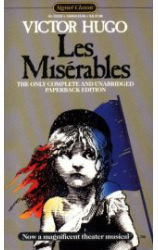
Author: Victor Hugo (Charles E. Wilbour translation, with modern notes)
Genre: Historical Fiction
Number of pages: 1488
Year Published: French: 1862, Original Wilbour Translation: 1863
Rating (out of 5): 5
The highly anticipated film version of Les Miserables to be released this Christmas will undoubtedly send devotees back to the timeless musical upon which the movie is based. But many forget even the musical is based upon an original source: Victor Hugo’s classic novel.
Often considered his masterpiece, Les Miserables has proved the most enduring of Hugo’s works. Even those who have never read the novel often recognize the characters. To call Les Miserables epic would prove a grand understatement, weighing in at about 1500 pages in the most commonly accepted English translation by Charles E. Wilbour and spanning the entire adult life of its major character as well as the countless intersecting lives.
This depth and attention to detail enables the reader to slide easily into the richly drawn world of nineteenth-century France. Although abridged versions leave out what some deem unnecessary detours into such subjects as the pidgin of the urban poor and the history of the Parisian sewer system, these addendums not only serve to deepen the reader’s appreciation for the setting, but the information often proves vital later on. How better to appreciate Jean Valjean’s harrowing journey through the sewers than with a full understanding of these labyrinthine tunnels, and how better to appreciate little Gavroche’s endearing songs than with an understanding of his dialect?
Despite the historical fiction setting, Les Miserables draws its scope beyond the breadth of its time and place. The language itself, even in translation, proves nothing short of breathtaking. Throughout the work, the reader finds himself pausing to relish the simple beauty of Hugo’s sentences, a pleasure that never flags even during the tautest of scenes. Furthermore, the story extends far beyond the tragic student revolution. As in the musical, that fateful night serves as the novel’s climax, but here the climax extends some 200 pages and expertly sweeps up a multitude of divergent storylines into one heartbreaking, electrifying, and ultimately life-affirming whole.
Every character here receives not just a song but a wholly realized life, with such histories that even those familiar with the popular musical will have something to learn. Most adaptations, for instance, do not acknowledge that the beloved Gavroche is in fact Eponine’s younger brother. These histories lend characters that may seem simplistic in the well-publicized drama greater complexity; never before have the sometimes excessively villainous Javert or the childishly sycophantic Azelma seemed so pitiable, even relatable.
It would be fair to conclude that, despite the desperate conflict at its heart, there are no villains in Les Miserables, only flawed mortals anxious that they might become heroes, and as readers we become invested in them all. We swoon for Marius and Cosette’s relationship just as we ache for Eponine’s unrequited love; we cheer Jean Valjean’s earnest hope of self-redemption just as we understand Javert’s irremediable dedication to his duty. Over the long course of these pages, these characters take on greater depth than any adaptation can afford them: their story has become akin to a life, a life from which one emerges with almost a sense of bereavement from the world to which he has dedicated so much emotion. Ultimately, this is less a novel than an experience.
Review by Jennifer Heine, A&S '16

 RSS Feed
RSS Feed
